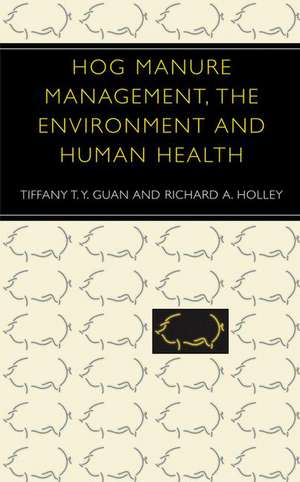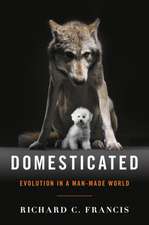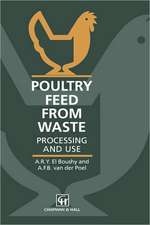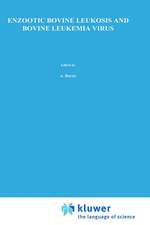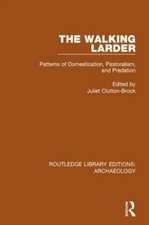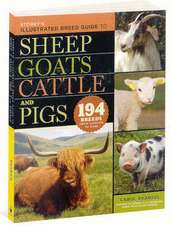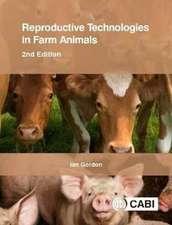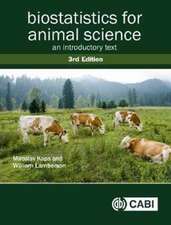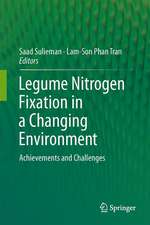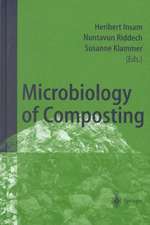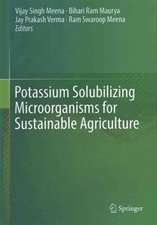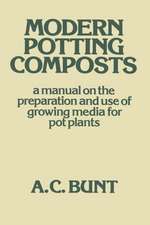Hog Manure Management, the Environment and Human Health
Autor Tiffany T.Y. Guan, Richard A. Holleyen Limba Engleză Hardback – 30 oct 2003
| Toate formatele și edițiile | Preț | Express |
|---|---|---|
| Paperback (1) | 941.50 lei 6-8 săpt. | |
| Springer Us – 16 oct 2012 | 941.50 lei 6-8 săpt. | |
| Hardback (1) | 945.47 lei 6-8 săpt. | |
| Springer Us – 30 oct 2003 | 945.47 lei 6-8 săpt. |
Preț: 945.47 lei
Preț vechi: 1153.02 lei
-18% Nou
Puncte Express: 1418
Preț estimativ în valută:
180.91€ • 188.89$ • 149.73£
180.91€ • 188.89$ • 149.73£
Carte tipărită la comandă
Livrare economică 04-18 aprilie
Preluare comenzi: 021 569.72.76
Specificații
ISBN-13: 9780306478079
ISBN-10: 0306478072
Pagini: 168
Ilustrații: X, 168 p.
Dimensiuni: 178 x 254 x 16 mm
Greutate: 0.45 kg
Ediția:2003
Editura: Springer Us
Colecția Springer
Locul publicării:New York, NY, United States
ISBN-10: 0306478072
Pagini: 168
Ilustrații: X, 168 p.
Dimensiuni: 178 x 254 x 16 mm
Greutate: 0.45 kg
Ediția:2003
Editura: Springer Us
Colecția Springer
Locul publicării:New York, NY, United States
Public țintă
ResearchDescriere
This volume provides a current look at how development of intensive live stock production, particularly hogs, has affected human health with respect to zoonotic diseases primarily transmitted by food but also by water, air and oc cupational activity. While information presented focuses on the development of increasing livestock production in Canada, examples are given and compar isons are made with other countries (Denmark, Taiwan, the Netherlands and the United States) where the levels of livestock production are much more intense and where the industry is more mature. Canada is also searching for solutions to enable handling the growing volume of its livestock waste properly. Lessons learned from the experience of those who have gone before are invaluable and are drawn together in this volume to serve as useful guidance for others in plot ting the courses of action possible to avoid serious environmental setbacks and negative human health effects through foodborne illness. A significant portion of the text is devoted to a discussion of enteric illness in humans caused by zoonotic pathogens. The second chapter deals with sur vival of pathogens (which cause foodborne illness) in manure environments. An evaluation of the human health hazard likely to occur from the use of ma nure as fertilizer is important because of the recent trend toward an increase in foodborne illness from the consumption of minimally processed fruits and vegetables that may have been fertilized with animal-derived organic materials.
Cuprins
1 Sources of Enteric Disease in Canada.- Summary.- Foodborne Transmission.- Waterborne Transmission.- Airborne Transmission/Occupational Exposure.- Direct Contact Transmission.- Conclusions.- References.- 2 Pathogen Survival in Swine Manure Environments and Transmission of Human Enteric Illness—A Review.- Summary.- Manure Handling and Foodborne Illnesses.- Effect of Increased Hog Production.- Environmental Survival of the Major Zoonotic Pathogens from Swine and Cattle.- Conclusions.- References.- 3 Pork Production and Human Health in the Major Pork Producing Countries.- Summary.- Denmark.- The Netherlands.- Taiwan.- The United States.- Canada.- Conclusions.- References.- 4 Reliability of Detection Methods for Pathogens and Availability of Molecular Methods.- Detection of Bacteria.- Detection of Viruses.- Detection of Protozoans.- Conclusions.- References.- 5 Wastewater Treatment and Alternative Methods of Swine Manure Treatment and Handling.- Municipal Wastewater Treatment.- Alternative methods of Swine Manure Treatment and Handling.- Swine Manure Handling in Major Hog Producing Countries.- References.- 6 Pathogen Transport in the Environment and its Relation to Public Health.- Conclusions.- References.- 7 Environmental Legislation and the Economic Impact on Intensive Hog Rearing Operations from the Perspective of Enteric Pathogens of Concern to Human Health.- Canada.- United States.- Europe.- Economic Impact.- Conclusions.- References and Further Reading.- 8 Risk and Prioritization of Gaps in Knowledge in Managing Pathogens Associated with Intensive Livestock Production.
Recenzii
"The authors of the book [Guan and Holley] … have done an excellent job of assembling scientific information that describes the relationship of manure management issues to human health problems in Canada and other major hog producing countries."
(J. Lloyd Spencer, DVM, MS, PhD, Research Scientist, Animal Disease Research Institute, Food Inspection Agency, Ottawa, Ontario, Canada)
"Hog Manure Management, the Environment and Human Health provides a current look at how development of intensive livestock production, particularly hogs, has affected human health with respect to zoonotic diseases primarily transmitted by food but also by water, air, and occupational activity. … The book will serve as a scientific resource for both researchers and students and be used by legislative policy makers at the municipal level in formulating regional guidelines for manure handling practices, and by industry association s in providing guidance to the agricultural community."
- Food Trade Review, December 2003
(J. Lloyd Spencer, DVM, MS, PhD, Research Scientist, Animal Disease Research Institute, Food Inspection Agency, Ottawa, Ontario, Canada)
"Hog Manure Management, the Environment and Human Health provides a current look at how development of intensive livestock production, particularly hogs, has affected human health with respect to zoonotic diseases primarily transmitted by food but also by water, air, and occupational activity. … The book will serve as a scientific resource for both researchers and students and be used by legislative policy makers at the municipal level in formulating regional guidelines for manure handling practices, and by industry association s in providing guidance to the agricultural community."
- Food Trade Review, December 2003
